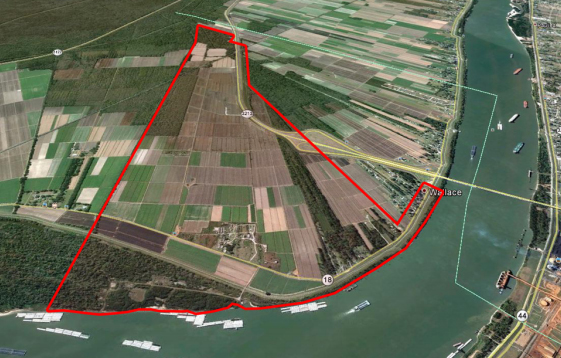Controversial grain elevator zoning decision faces delay amidst legal and environmental concerns
Published 4:44 pm Tuesday, October 24, 2023
|
Getting your Trinity Audio player ready...
|
On Monday, October 16, the Parish’s Planning Commission convened to deliberate on more than 1,000 acres of land owned by Greenfield, a grain exporting firm, situated in Edgard between the Wallace neighborhood and the Whitney Plantation Museum.
In 1990, Ordinance 90-27 altered the land’s zoning, changing it from residential to industrial use. Six years later, the then Parish President Lester Millet Jr. received a 57-month prison sentence after being found guilty of extortion, money laundering, and violation of the Travel Act. These charges were related to his efforts to assist Formosa Plastics Group in establishing a rayon pump facility in Wallace. The Court of Appeals at the time noted that these efforts included using illegal means to persuade neighboring property owners to transfer their property to Formosa.
While the plans for the facility ultimately fell through, the Wallace area had already been rezoned for industrial use in April 1990, coinciding with Formosa’s purchase of the land. This rezoning remained in effect, and the land was subsequently used for sugarcane farming.
On Aug. 4, Judge J. Sterling Snowdy issued a ruling that invalidated a disputed 1990 regulation, reverting the land from its industrial zoning to its original residential zoning status. The ruling declared Ordinance 90-27 null and void ab initio, meaning it was null from the beginning and never held any legal effect.
St. John the Baptist Parish itself initiated the most recent rezoning request from residential to industrial on behalf of Greenfield.
Parish President Jaclyn Hotard clarified that such applications fall within the council’s purview, though the parish had not made such a request in recent memory. Representatives from Greenfield refrained from commenting on why they had not directly submitted the zoning application.
Dr. Joy Banner and Jo Banner, co-founders of the local advocacy group The Descendants Project, initiated legal action to have the 1990 zoning modification revoked, alleging that then-Parish President Lester Millet had acted unlawfully. Greenfield and parish officials contended that the 1990 zoning change had been executed legally.
In August, The Descendants Project sought a restraining order against the parish to prevent the rezoning back to industrial status. Judge Nghana Lewis granted this restraining order on Aug. 21.
The day after, the parish council voted to uphold the 1990 zoning decision, which Hotard claimed prompted the recent rezoning request.
“They voted to table the vote until December to give the commission enough time to study. I will say, the planning and zoning commissioners were really concerned, and they really wanted to make the right decision,” said Dr. Banner, co-founder of The Descendants Project. “They understood that there were issues in the application, but most importantly, understood the need to study this more.”
During the meeting, those opposing the grain elevator expressed concerns about potential health impacts due to grain dust, disturbances caused by noise and light pollution, and the considerable size of the elevator, expected to reach a towering 273 feet.
Proponents argued that Edgard lacks employment opportunities and that the grain elevator would bring more jobs to the area.
The land had been previously converted from residential to heavy industrial zoning in 1990 when Formosa was considering the construction of a chemical plant at the site, though that project was ultimately abandoned.
In an interview with L’OBSERVATEUR, Dr. Banner cited a study done by Kimberly Terrell, director of community engagement and a staff scientist with the Tulane University Environmental Law Clinic on the lack of industry jobs held by Black people in the area known as “Cancer Alley” in majority Black communities.
According to the study, the highest disparity was found in St. John the Baptist Parish.
“At Monday’s meeting, the main argument was jobs, jobs, jobs, but aligning that with Kim Terrell’s study that Black communities are having to pay the price from the land, from our health, but we are not getting the jobs anyway,” Dr. Banner said. “I think that is significant to this story.”
On Oct. 18, Pamela Spees, a senior staff attorney for the Center for Constitutional Rights, sent a letter on behalf of The Descendants Project to Samuel Accardo, Counsel for St. John the Baptist Parish, regarding an alleged conflict of interest.
“In records obtained from the Parish relating to this rezoning application, Gaumet Holdings, LLC, was listed as an owner of property immediately adjacent to the land the Parish seeks to rezone,” said the letter. “As such, the company was sent notice of the Parish’s proposed rezoning from the Planning Commission.”
The letter included a map showing multiple properties owned by Gaumet Holdings adjacent to and even within the tract the Parish seeks to rezone, based on a map provided by the Planning Department.
“According to the Louisiana Secretary of State database, Ms. Darla Gaudet, is an officer/manager of this LLC. We understand that Ms. Gaudet is President Hotard’s mother-in-law, and also President and CEO of St. John Fleeting,” said the letter. “We believe this makes President Hotard’s involvement in the attempt to rezone a violation of the Louisiana Code of Ethics.”
The letter cited La. R.S. 42:1112(B), which states that “No public servant, except as provided in R.S. 42:1120, shall participate in a transaction involving the government entity in which, to his actual knowledge, any of the following persons has a substantial economic interest: (1) Any member of his immediate family…”
La. R.S. 42:1102(13) defines “immediate family” as including a public servant’s spouse and the parents of their spouse.
The letter also defined “transaction involving the government entity,” citing La. R.S. 42:1102(23), which states, “[A]ny proceeding, application, submission, request for a ruling or other determination, contract, claim, case, or other such particular matter which the public servant or former public servant of the governmental entity in question knows or should know: (a) Is, or will be, the subject of action by the governmental entity. (b) Is one to which the governmental entity is or will be a party. (c) Is one in which the governmental entity has a direct interest. A transaction involving the agency of a governmental entity shall have the same meaning with respect to the agency.”
If the zoning application is approved, Greenfield’s last requirement would be securing a permit from the Army Corps of Engineers, who are currently conducting a review indicating adverse effects on five out of 20 historic sites in the parish due to the grain terminal. Nonetheless, the review is ongoing as part of the permitting process.
“Action will be taken on the item at the Nov. 13 meeting,” said Hotard.
Note: This article has been updated to provide more context into the past rezoning of the land. L’OBSERVATEUR has also published an article regarding the Aug. 4 ruling. More updates to come.






